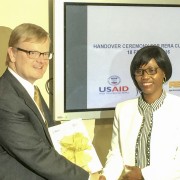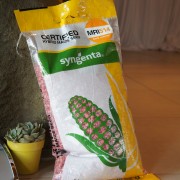USAID promotes sustainable economic growth in targeted areas by integrating climate change into policy and decision making, and ensuring sound management of transboundary natural resources. We support the Global Climate Change Initiative and Congressional Biodiversity and Water goals.
Through our environmental programs, we enhance resiliency of critical river basins, improve capacity to cope with climate change, advance environmental innovation and support low emissions development.

The U.S. government commemorated the completion of a new regulatory training curriculum with a formal hand-over ceremony with its energy sector partner, the Regional Electricity Regulators Association of Southern Africa (RERA). The National Energy Regulator of South Africa (NERSA) hosted the hand-over ceremony.
Strengthening the overall resiliency of the Limpopo River Basin ecosystems, and the people dependent upon them, is necessary for sustainable development in the region. There is a need to bolster participatory processes built on sound science that effectively incorporates ecological, social and economic aspects of water resource management in the face of climatic change.

United States Agency for International Development (USAID) and the Department of Small Business Development (dsbd) today announced the official launch of Finfind, a web-based solution that brings together financiers from the private sector and government, business consultants and the small business owner to increase access to finance.

Swaziland launched a new early maturing, drought tolerant and high yielding Maize seed known as MRI 514. This hybrid maize seed introduction is a success story for regional trade and integration, food security and cooperation within SADC. The MRI 514 seed is introduced into the Swazi market through collaboration between the Zambian and Swazi seed companies to make a quality product available to local farmers. This highlights the importance of partnership within the SADC region as acknowledged by Mr. Mavuso a representative of the Swaziland Ministry of Agriculture.







Comment
Make a general inquiry or suggest an improvement.